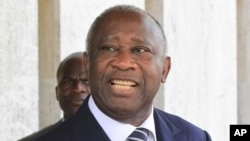African negotiators are working to find a solution to the standoff in Ivory Coast, where incumbent President Laurent Gbagbo refuses to step down after an election the United States, United Nations and many African leaders say chose a new president, Alassane Ouattara. Messy power transitions are nothing new for Africa.
Analysts agree that peaceful transitions of power are essential to ensure stability in Africa.
Patrick Smith writes for Africa Confidential, a newspaper that covers the continent.
"If you look at most of the economic and political crises in Africa, they have at least been partly prompted if not wholly caused by disputes over succession," he said.
Author Michela Wrong has been writing about Africa and its leaders for more than 15 years.
"There is a lot of research showing if you have had a military coup in your country, you are far more likely to have a military coup again in the next five years, she said. "So you enter a descending spiral where the more unstable you are, the more unlikely you are to be unstable in the future."
"It is essential that these transitions are peaceful, because in so many African countries, as we saw in the 1990s when this process started, people went to pick up a gun rather than a ballot," said Richard Dowden, of London’s Royal African Society.
That is what happened in Zaire, now the Democratic Republic of Congo. In 1997, then-leader Mobutu Sese Seko refused to step down. He eventually fled the country and died in exile. But the struggle for power and resources sparked a war that has cost at least three million lives.
And analysts say widespread violence could also break out in Ivory Coast, where Laurent Gbagbo has refused to give up power. Dowden says President Gbagbo should go.
"The idea that he thinks he can stay on. even though he clearly lost the election, shows him to be something else," he said. "Another terribly stubborn leader who simply does not understand the way the world works these days."
Wrong says the reason African presidents cling to power is simple. It is all about money.
"Historically, power has been money in Africa," she said. "The private sector is small, access to key contracts, you got them by being in power or being very close to someone in power."
And she says in many cases it is the people around the leader that are the problem.
"It is not just an aging president who can not bear to step down, there are also all the generals that he befriended, his aides, his wife, the family members who went into government," she said. "There is a whole entourage who do not want him to step down."
But Smith says there are encouraging signs. He says voter turnout in Africa is consistently higher than in the West.
"In terms of enthusiasm for democracy, Africa probably ranks pretty high globally," he said.
And as more Africans have access to mobile phones and the Internet, there is more accountability, Smith says.
"You are seeing a very rapid reaction where elections appear to have been stolen," he said.
But Dowden says Africa, with its tribal divisions is not suited to Western-style elections.
"This is just obviously, obviously to me, not the best system for Africa," he said. "It needs democratic systems that reflect the realities of the societies. How you do it, I do not know."
In addition to Ivory Coast and Uganda, analysts are concerned about power transitions in Rwanda and Zimbabwe.
*** Note: An earlier version of this story stated former Liberian President Charles Taylor had been sent to the International Criminal Court in The Hague where he faced war crimes charges. Mr. Taylor is being tried by the Special Court for Sierra Leone, not the ICC. VOA regrets the error.

















